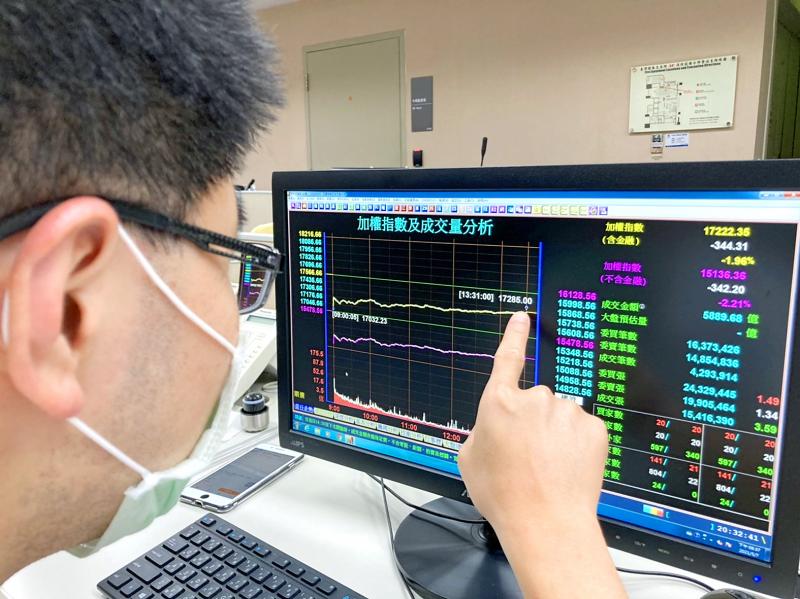The number of day traders surpassed 3 million for the first time last month, accounting for a record 14.5 percent of all investors, as more embraced day trading amid a bullish stock market, Financial Supervisory Commission (FSC) data showed on Tuesday.
The number of day-trading accounts grew 41 percent from 2.19 million a year earlier to 3.09 million at the end of last month, compared with an annual rise of 7.5 percent of stock-trading accounts to 21.29 million, the data showed.
Among the 1.5 million newly opened stock-trading accounts over the past year, 90 percent were day-trading accounts, indicating that the practice has become popular among investors, the commission said.

Photo: Chen Rou-chen, Taipei Times
The ratio of day trading accounts to overall stock-trading accounts tallied 11.07 percent last year, up from 9.58 percent in 2019 and 8.37 percent in 2018, data showed.
Day-trading transactions made up about 40 percent of all transactions last month, up from 30 percent a year earlier, Taiwan Stock Exchange data showed.
Day trading has grown in popularity as investors seek to profit on price spread amid a rosy stock market, while it could also be attributed to an extension of a tax cut on day-trading transactions, a commission official said by telephone on Wednesday.
Day trading can be risky, especially for investors who are not familiar with their targeted stocks or who make investment decisions based on hearsay or opinions, the official said.

Hon Hai Precision Industry Co (鴻海精密) yesterday said that its research institute has launched its first advanced artificial intelligence (AI) large language model (LLM) using traditional Chinese, with technology assistance from Nvidia Corp. Hon Hai, also known as Foxconn Technology Group (富士康科技集團), said the LLM, FoxBrain, is expected to improve its data analysis capabilities for smart manufacturing, and electric vehicle and smart city development. An LLM is a type of AI trained on vast amounts of text data and uses deep learning techniques, particularly neural networks, to process and generate language. They are essential for building and improving AI-powered servers. Nvidia provided assistance

DOMESTIC SUPPLY: The probe comes as Donald Trump has called for the repeal of the US$52.7 billion CHIPS and Science Act, which the US Congress passed in 2022 The Office of the US Trade Representative is to hold a hearing tomorrow into older Chinese-made “legacy” semiconductors that could heap more US tariffs on chips from China that power everyday goods from cars to washing machines to telecoms equipment. The probe, which began during former US president Joe Biden’s tenure in December last year, aims to protect US and other semiconductor producers from China’s massive state-driven buildup of domestic chip supply. A 50 percent US tariff on Chinese semiconductors began on Jan. 1. Legacy chips use older manufacturing processes introduced more than a decade ago and are often far simpler than

STILL HOPEFUL: Delayed payment of NT$5.35 billion from an Indian server client sent its earnings plunging last year, but the firm expects a gradual pickup ahead Asustek Computer Inc (華碩), the world’s No. 5 PC vendor, yesterday reported an 87 percent slump in net profit for last year, dragged by a massive overdue payment from an Indian cloud service provider. The Indian customer has delayed payment totaling NT$5.35 billion (US$162.7 million), Asustek chief financial officer Nick Wu (吳長榮) told an online earnings conference. Asustek shipped servers to India between April and June last year. The customer told Asustek that it is launching multiple fundraising projects and expected to repay the debt in the short term, Wu said. The Indian customer accounted for less than 10 percent to Asustek’s

Gasoline and diesel prices this week are to decrease NT$0.5 and NT$1 per liter respectively as international crude prices continued to fall last week, CPC Corp, Taiwan (CPC, 台灣中油) and Formosa Petrochemical Corp (台塑石化) said yesterday. Effective today, gasoline prices at CPC and Formosa stations are to decrease to NT$29.2, NT$30.7 and NT$32.7 per liter for 92, 95 and 98-octane unleaded gasoline respectively, while premium diesel is to cost NT$27.9 per liter at CPC stations and NT$27.7 at Formosa pumps, the companies said in separate statements. Global crude oil prices dropped last week after the eight OPEC+ members said they would